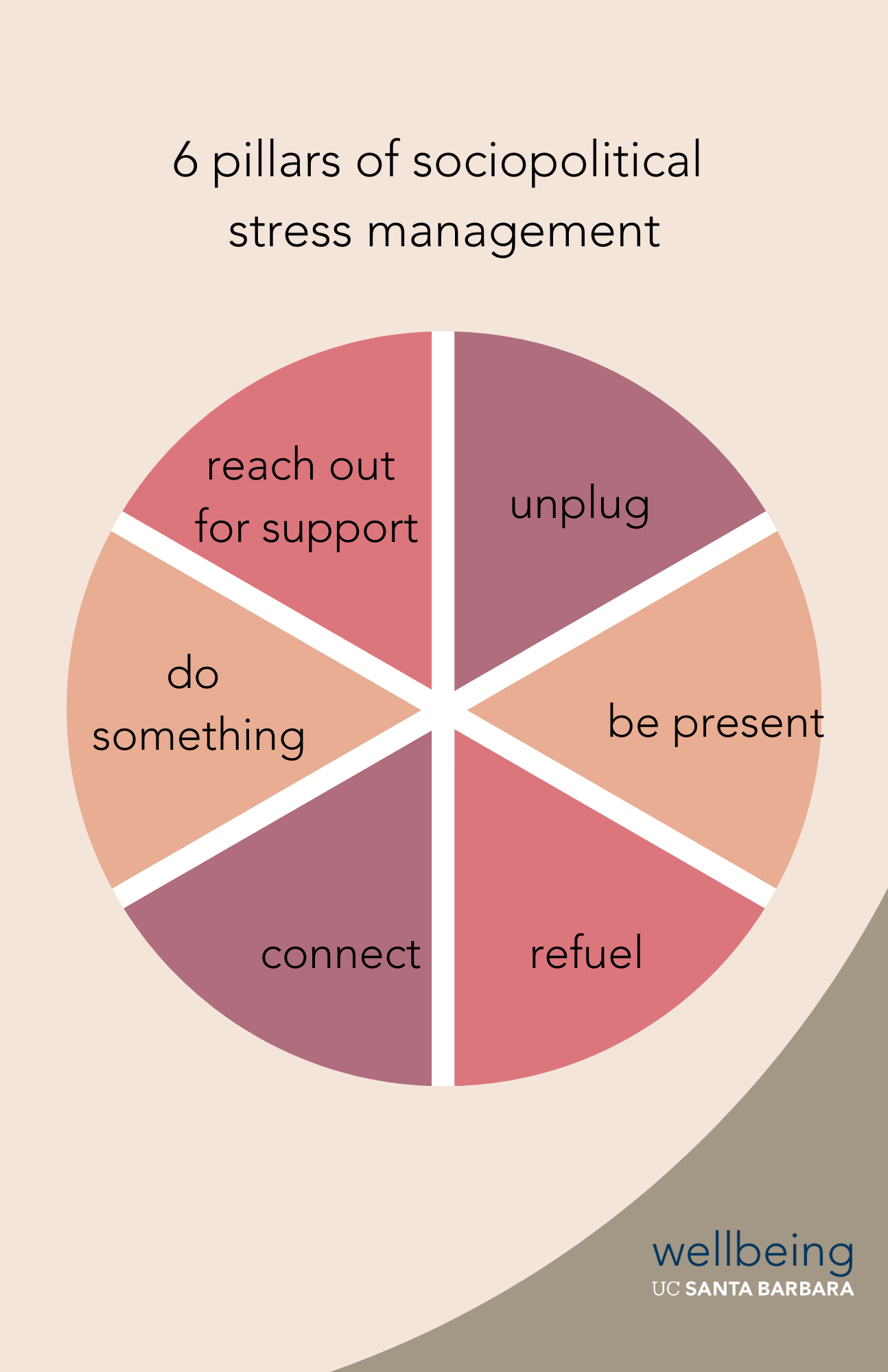6 Pillars of Sociopolitical Stress Management
In stressful sociopolitical climates, U.S. adults often experience significant amounts of stress in their lives. Sociopolitical stress can have a significant impact on mental health, particularly for college students.
Many people are feeling overwhelmed, anxious, angry, and at times, helpless.
We recognize that the political climate may be particularly challenging for many of us on campus.
Those who identify with historically marginalized communities may be bearing the weight of these challenges most acutely.
UC Santa Barbara is committed to supporting campus mental health and wellbeing and creating opportunities to practice empathy and compassion towards each other.
Below are some ideas on how to manage sociopolitical stress:

- Set Boundaries with Media Consumption. Constant exposure to negative news or political debates can heighten stress and anxiety. Limiting your intake can help preserve mental well-being.
- Set specific times during the day to check the news or social media, and avoid looking at these sources right after waking up or before going to bed. Consider following news outlets that provide balanced perspectives, and mute or unfollow overly distressing accounts or pages.
- Use apps that limit your screen time on certain platforms or set “do-not-disturb” modes during study time.
- Avoid Dwelling on Things You Can’t Control. When uncertainty strikes, many people immediately imagine worst-case scenarios. Break the habit of ruminating on bad outcomes by focusing on what you can control. Recognize your feelings and reactions and permit yourself to feel the way you do. Although avoiding can be useful at times, ignoring strong emotions can have a negative impact. Practicing mindfulness & meditation can help you stay grounded in the present moment, reducing anxiety about the future or past events that may contribute to sociopolitical stress.
- How to do it: Incorporate mindfulness practices such as meditation, deep breathing exercises, or progressive muscle relaxation into your daily routine. Apps like Headspace or Calm offer guided sessions. Even 5–10 minutes a day of mindfulness can make a noticeable difference. You can practice it while walking to class or during a break from studying.
- Don’t forget to take care of yourself before, during, and after the election. Here are some ideas: Take deep breaths, stay hydrated, get plenty of rest, practice mindfulness, eat nutritious meals, and watch your caffeine intake.
- Find an activity that you enjoy and spend time doing it. Consider activities such as being in nature, engaging in an arts and crafts project, reading something fun, baking, playing a game, and listening to music.
- Move your body! What type of movement do you enjoy? Moving helps us release the energy we experience when we feel stressed. Move a little every day. Try stretching, taking a walk, dancing, etc.
- Practice positive psychology. Seek out positive stories and news. It’s an important reminder of the positive things in life and the strength of the human spirit. Practice gratitude for the things and the people in your life you feel thankful for.
- Engage with supportive friends and allies. Social support is crucial in managing stress. Having people to talk to about your concerns can help you process and make sense of difficult emotions. Talk about current issues, if needed, but be aware of when you’re feeling overwhelmed. Try not to judge your emotions or to judge others. Remember that we are all different and need different things to self-soothe. Be open to conversations about differing political opinions, but also set boundaries with individuals who engage in hostile or divisive rhetoric that may intensify stress.
- Get involved in issues that are meaningful to you. Consider advocacy and community involvement in ways that fit you.
- A good place to start is to reflect on what type of support best suits your needs. Please read the below section for help narrowing your search:
Identifying Symptoms of Sociopolitical Stress
If you notice any of the following signs, you may be suffering from sociopolitical stress:
- Anxiety: Finding yourself thinking about the political climate constantly and its implications, which can increase anxiety and worry, making it hard to relax and enjoy your usual activities.
- Depression: Feelings of helplessness, hopelessness, or a lack of control over the situation.
- Anger and Frustration: Intense frustration about the political or social system, particularly when feeling powerless to influence change.
- Cynicism or Pessimism: Loss of trust in political systems, leaders, or society at large, often resulting in a sense of disillusionment.
- Intrusive Thoughts: Constantly ruminating on political events, societal issues, or negative news
- Emotional Numbness: A sense of detachment from the world or the inability to engage emotionally with current events.
- Difficulty Concentrating: Having trouble focusing on work, studies, or your personal life due to racing thoughts about the political climate.
- Overthinking: Excessively analyzing political developments or social conditions, sometimes leading to “analysis paralysis” or confusion
- Decision-Making Paralysis: Difficulty making everyday decisions as the larger societal context feels uncertain or overwhelming.
- Withdrawal: Avoiding social interactions, discussions, or news to escape the overwhelming stress associated with sociopolitical issues.
- Hypervigilance: Constantly monitoring news or social media for updates, often resulting in information overload.
- Disengagement from Community: A reduction in involvement with local or broader community activities due to disillusionment with society.
- Fatigue: Chronic tiredness that can result from mental strain and worry about sociopolitical issues.
- Sleep Disturbances: Waking up feeling tired or having trouble getting a good night's rest because your mind is constantly ruminating on political events, societal issues, or negative news
- Headaches: Physical tension and stress leading to headaches or migraines.
- Increased Heart Rate or Palpitations: A physical response to the stress and anxiety created by sociopolitical turmoil.
- Digestive Issues: Stress-related symptoms like stomach aches, nausea, or changes in appetite.
- Tension in Relationships: Growing conflict or strain in relationships due to differing political opinions or anxiety about the sociopolitical climate.
- Social Withdrawal: A tendency to distance oneself from family, friends, or social groups, especially when feeling disconnected from those who don’t share the same concerns.
- Increased Hostility or Aggression: Exhibiting more confrontational or aggressive behavior, either in person or online, often as a reaction to frustration or a sense of injustice.
- Loss of Meaning: A sense of disorientation or questioning the purpose of life or personal values in the face of societal chaos or political instability.
- Moral Injury: Emotional distress caused by the perception of widespread injustice, corruption, or unethical practices in the sociopolitical system.
- Sense of Powerlessness: A sense that individual actions have little effect on broader political or social systems, leading to frustration and withdrawal.
- Increased Social Media Consumption: Spending excessive time on social media platforms to stay informed or participate in political discourse, leading to heightened stress.
- Echo Chamber Effect: Engaging in online spaces where only like-minded views are reinforced, potentially increasing polarization and stress.
YOU ARE NOT ALONE! There are many ways to manage sociopolitical stress and there are resources available to you.
Identifying Your Support Needs
It can be important to identify what you are needing in terms of support. Sometimes the answer to that can change multiple times during the day. Here is a broad overview of some of the campus resources available to students:
- RESPITE:
- If you are in need of a group decompression space that may provide some respite from election conversations. The Department of Health & Wellness has many offerings including:
- Meditation Groups Practice
- Wellness Soup Wednesday
- Wind Down Wednesday
- Rejuvenation Station
- CARE (Campus Advocacy, Resources, and Education) offers support those who are survivors of trauma including:
- 24/7 access to safety planning and resource navigation via their phone line - 805-893-4613
- Virtual Healing Room
- In addition, the Department of Recreation has many classes and spaces that can help you decompress including:
- Adventure Programs
- Gaucho Rec Classes
- Access to Rec Facilities (fitness centers, pools, gyms etc)
- If you are in need of a group decompression space that may provide some respite from election conversations. The Department of Health & Wellness has many offerings including:


- GROUP PROCESSING: If you are in need of group discussions, group processing, and finding likeminded people, there are resources for you including:

- POLITICAL DISCOURSE: If you are hoping to engage in political discourse in a diverse group of people, you can search for academic classes that present these opportunities. Or check out campus events tailored for this purpose.
- SUPPORT IN THE ACADEMIC SPHERE: If you are needing support around academics and navigating the demands of your courses:
- Talk to your TAs/Professor during office hours!
- Meet with your Major advisors and your college academic advisors
- For additional support around academic skills, check out CLAS (Campus Learning Assistance Services)
- INDIVIDUAL SUPPORT:
If you are hoping for individual support regarding the impact of the election or other sources of distress, you have many options at UC Santa Barbara that include:
- UCSB CAPS (Counseling & Psychological Services)
- UCSB’s Mental Health Peer Program (Part of CAPS)
- UCSB Social Work Services
- UCSB ADP (Alcohol & Drug Program)
- UWill Online Mental Health Resources & Therapy
For a more comprehensive breakdown of direct mental health support, please visit the mental health section of the wellbeing website:
Online Support with Uwill
Uwill
In addition, check out Uwill, an online mental health resource that is contracted with UC Santa Barbara CAPS (Counseling & Psychological Services). This service is available to all UC Santa Barbara students!
It provides teletherapy appointments and crisis conversations complemented by wellness programming – all tailored to your preferences.
Uwill is available with the use of free available credits (plenty are available) and can also be used for brief online therapy 30 minute sessions without needing the approval from CAPS.
Additional sessions can be extended upon request with CAPS as well!
You can register for Uwill here with your UCSB email address:
Register for Uwill (Online Mental Health Resources & Therapy)
